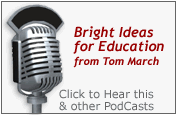 G'Day Faithful Friends, Well, it's hard to imagine, but it's been a few years since I've sent out a monthly newsletter. Does time fly or what?! It's not as though things haven't been busy in our little corner of the world, but I've buffed up the Web site, focused my aim and Because it's "welcome back" time, let's take a look at some "big picture" things and then in coming months, we can focus on specifics. Immutable Trends - http://tommarch.com/ozblog/themes/ Why should schools bother with technology? It's such a hassle when things stuff up. The kids often get up to mischief. Isn't there enough to do already?! I've become convinced that it's not only engaging and exciting to integrate technology into learning, but not doing so will soon be seen as professional malpractice. A series of what I call "Immutable Trends" act as the foundation of my perspective. Things like "tech's appeal," "ubiquitous consumption," "assembly lyin'" and "crumbware" are silly names that connote huge societal trends that are altering our children's lives and necessitate new approaches to "schooling." The Web address above links to a page that briefly describes a collection of Immutable Trends and related Educational Challenges. Clipmarks - http://clipmarks.com/ Do you ever (always?) find yourself with a dozen browser windows or tabs open - great sites that you really should bookmark or blog about? Are you secretly relieved when the browser crashes under this weight and you lose these gems forever? Although I've played with it for over a year, it wasn't until I decided to use Clipmarks to track the Trends just mentioned. Sure, I'd love to blog about each instance, but some days so much is happening, I could never h ope to. Now I use Clipmarks to gather sections of Web pages, add a brief (thank you!) comment and tag the clip for easy sorting and reference. Then, instead of making a blog post for each, I've embedded a Clipmarks window at TomMarch.com that invites you to look if you like while I have a well-classified set of references for later articles or presentations. Do yourself a favor and become a "clipper." Diigo / Educator - http://diigo.com/education Along the similar lines to Clipmarks is Diigo. Pronounced "Dee'go," it's an acronym for "Digest of Internet Information, Groups and Other stuff." I've had the pleasure of skyping with a couple of Diigo's founders and am impressed with their commitment to education. In fact, of all the social networking / bookmarking sites, Diigo is the only one to really target classroom use of such Web 2 facilities. Diigo just launched its education version. It's still early days, but the tool is fantastic and the interest in education sincere. What's especially good about Diigo compared to Clipmarks is that it allows users to highlight and comment on passages within online documents all within the contex t of a social networking sturucture so we can enter into a virtual close reading with other Diigo users. By example, register for Diigo, then go to Nicholas Carr's Atlantic Monthly article, "Is Google Making Us Stoopid?" Pageflakes - http://pageflakes.com Finally, the last Bright Idea for this month is a Pageflakes. If you've used iGoogle, you'll have a pretty good idea what Pageflakes is. Sometimes referred to as "start Pages" or "Jump Pages," these Web 2 apps allow you to draw together heaps of RSS feeds onto one page. In the old days we used things like Bloglines as RSS aggregators, but as amazing as these were, you'd still have to click on each feed to see its posts. Mostly, I didn't click. But that's okay, because now all you have to do is "hover." Most blogs will list a row of links to other sites they like. You can see my list here. But if you look closely, the very first link on the list goes to a Pageflakes version that shows all these same blogs and first five post all on one page. But it's not just about keeping up on your ed blogs. You can make multiple pages, each one focused on a different topic ("climate change," "tessellations," "current events," "best recipes," etc.). Every blog, podcast, newspaper, magazine, radio station, etc. that provides an RSS/XML feed can appear in you Pageflakes collection. What's best is that these pages can then be shared with colleagues or students. To get yourself and friends started on this (quality of) life saving approach, you can use a step-by-step screen-clip friendly tutorial I made for a workshop.
It would be great to hear from you again.
|

